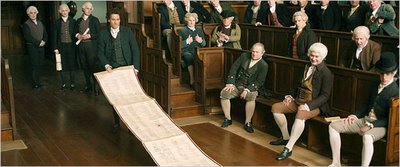
The abolitionist biopic Amazing Grace opens in the United States on Friday, and in the United Kingdom a month later, but I have no idea yet when it will come to Canada. In the meantime, it is intriguing to read today’s New York Times feature on the film:
Still, the makers of “Amazing Grace” say their movie raises broader issues.
For Steven Knight, the film’s British screenwriter, public opinion was for the first time mobilized to press for social reform with the campaign for the abolition of the trans-Atlantic slave trade. In that sense the use of petitions (including one carrying 390,000 signatures), public meetings, books and pamphlets heralded the birth of modern democratic politics.
Mr. Apted saw an opportunity to emphasize the importance of politics, then and now. “I wanted to do a story about the corridors of power,” he said by telephone from Washington, where he was promoting “Amazing Grace.” “I am trying to shine a light on the value of politics.”
For its part Bristol Bay Productions, which financed the $28 million production and favors, in its own words, “uplifting stories,” is looking to communicate a more urgent message. Coinciding with the movie’s release the company, owned by the American billionaire Philip F. Anschutz, has started a campaign called Amazing Change to raise awareness of the continuing existence of slavery around the world.
“An estimated 27 million people are living in slavery today,” the company said in a press statement explaining Amazing Change. “It’s hard to imagine, but there are more people living in slavery than at other times in history.” . . .
As it happens, Bristol Bay Productions initially wanted a biopic focused on Wilberforce’s faith, “which is why I and a lot of other people didn’t want to make it,” Mr. Apted recalled. “I wanted to center the whole film on the anti-slave trade debate, and they agreed. To me it is about people who have a moral or religious sense of purpose and yet manage to operate in the world.” . . .
I hate to sound cynical, but I am vaguely reminded of how Bristol Bay’s parent company, Walden Media, produced The Chronicles of Narnia: The Lion, the Witch and the Wardrobe (2005) and marketed it heavily to Christians while neglecting to mention that the film actually waters down the story’s Christian content.
I cannot help but also wonder if these filmmakers would also be so candid about the fact that Wilberforce and abolitionists like him were heavily involved in campaigns against alcoholic drinks, forms of entertainment on Sunday, the publication of books that were perceived to be blasphemous and obscene, and so on.
Are the filmmakers truly trying to encourage involvement in politics, period, or only involvement in certain kinds of politics?
Oh, and apparently Wilberforce was also strongly opposed to gambling, and Anschutz has been trying for years to get a license for a “super casino” from the British government. Hmmm.
FEB 19 UPDATE: Mollie at GetReligion.org comments on the New York Times story:
Perhaps I find this all so interesting because the film — which I enjoyed — had a remarkable lack of religion in it, considering who Wilberforce was. There’s even a scene where William Pitt is dying (I would consider this a spoiler if it hadn’t happened hundreds of years ago) and tells Wilberforce that he wishes he had his faith. Wilberforce responds by talking about politics. This is not the Wilberforce I’ve read about.
Incidentally, I just learned the film is opening in Canada on March 23, and there will be a screening here shortly before then.











